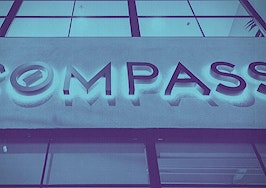After years of speculation, Compass is one day away from its much-awaited initial public offering (IPO). The company is expected to start trading on the New York Stock Exchange on Thursday with the ticker symbol COMP.
The company is going public in choppy waters. The company initially planned to offer 36 million shares of Class A common stock between $23 to $26 per share; however, an amended S-1 filed on Wednesday revealed the company is dropping the number of available shares to 25 million and the price range of those shares to $18 to $19.
As a result, Compass will raise between $450 million and $475 million on IPO day — a steep drop from the previous goal of $828 million to $936 million laid out in the company’s initial S-1 filing. The new stock pricing implies a valuation for the entire company of approximately $7 billion, down from roughly $10 billion.
The drop in offering price suggests less enthusiasm from institutional investors in Compass’ stock than expected. The offering itself also serves as a bellwether for major Compass investor SoftBank, whose CEO and founder Masayoshi Son said in February he hoped Compass would be another “golden egg” alongside Opendoor after its IPO.
The real test will come when the stock begins trading publicly, likely on Thursday morning.
Here’s what to watch for this afternoon, tomorrow morning, at the close of market on Thursday, and then going forward.
Wednesday afternoon: Setting of initial price per share
Initially expected to fall in the $23 to $26 per share price range, Compass’s stock is now expected to price between $18 and $19, per the company’s amended S-1 filing on Wednesday.
Compass will set the final offering share price on Wednesday sometime after the close of the market. That’s the first big marker to watch for.
Once the price is determined, Compass will know how much they’ll earn from the offering (regardless of stock fluctuations), and underwriters Morgan Stanley, Goldman Sachs and Barclays will be allowed to exercise their option to purchase 5.4 million shares offered to them in the March 23 S-1.
Thursday morning: Off to the races
Although the New York Stock Exchange begins trading at 9:30 am ET, Compass (NYSE: COMP) could start offering stocks for purchase as late as 12:30 pm ET. However, before the public can get a crack at Compass, the company’s underwriters must allocate shares to the institutional investors that offered bids during the roadshow.
This process, financial site IPOhub explains, is delicate — the number of shares each institutional investor receives is based on the “expected behavior of potential shareholders.” The underwriters will also dole out shares based on the expected actions of the institutional investors themselves, with underwriters being wary of investors who are quick to fold or will hold on too long.
“Ultimately, underwriters try to allocate shares to a good mix of investors to ensure healthy prices and liquid markets for the stock,” they added.
After that process is over, it’s time to offer the shares on the public stock exchange for the agreed-upon opening price. Once the stock opens for trading, however, the price can go any direction based on the public’s sentiment about Compass’ growth potential, the road to profitability and whether investors truly believe their tech company status.
Thursday: Watch for opening-day stock gyrations
So, what could the first day of trading yield for Compass? Although institutional investors have exercised some caution about Compass’ path on Wall Street, public investors could still drive the company’s stock price up in what’s called a “first-day pop.”
IPOhub explains that a “first-day pop” is where the excitement of trading results in strong returns for the company, averaging around 14 percent. Depending on how big of a “pop” Compass experiences, the company’s valuation could rise back to the $10 billion mark. Or, public investors could take a cue from Compass’ Wednesday announcement and drive the valuation down further.
Although Compass is likely hoping for a “pop,” IPOhub said an excessive first-day pop can cause a headache just as much as a less-than-stellar debut.
“One of the major disadvantages of an excessive first-day pop is that the company going public does not receive the maximum amount of capital that the IPO could have raised—institutional investors and other shareholders benefit from the increased value of the shares,” the explainer concluded. “In other words, the company has left money on the table that they could have received had they priced their shares higher, at the prevailing market price.”
“In addition to leaving money on the table, large first-day returns can also create unrealistic expectations and lead to a price correction in the months following the IPO,” it added.
Thursday afternoon: The closing bell
Compass’ shares will close after their first day of trading at 4:00 p.m ET, when the New York Stock Exchange halts trading for the day. (The shares will continue to trade on after-hours markets.)
The close will offer a good moment to take stock of how the market has received Compass’ offering, and how its valuation compares to peers including Realogy, RE/MAX, Redfin and more.
It will also offer a moment to take stock of the new net worths, at least on paper, of Compass executives, as well as shareholders who acquired shares in Compass via acquisition or stock option grants over the past years.
Months ahead: Path to profitability is uncertain
Once the stock is public, Compass will now be beholden to the market to issue quarterly earnings reports. Those early earnings reports are likely to focus on the company’s profitability, or lack thereof.
Compass’ amended S-1 filings in March revealed what may be keeping institutional investors from getting their hopes up — rapid-fire spending without a path to profitability.
The March 23 S-1 filing boasted an increase in company revenues from $2.4 billion to $3.7 billion in 2020 and a 3 percent increase to 4 percent market share from 2018 to 2020. However, the filing also revealed net losses of $388 million and $270.2 million in 2019 and 2020, respectively, and an accumulated deficit of $1.1 billion, as of December 31, 2020.
However, the company admitted it “may not be able to achieve profitability” due to several factors including declines in transaction volume, increased competition, and the mounting costs of recruiting talent that reportedly hinges on two-to-three-year contracts with unprecedented benefits such as hefty signing bonuses and favorable splits.
So how’s it all going to go down? Stay with Inman for complete coverage all day on Thursday, and beyond.













